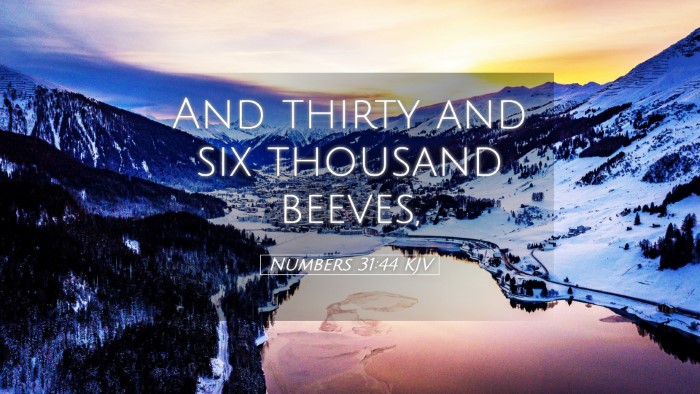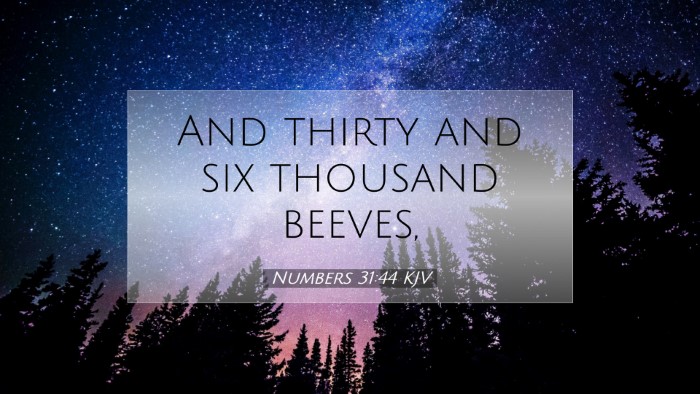Bible Commentary on Numbers 31:44
Verse Overview: Numbers 31:44 states, "And the half, which was the part of the children of Israel, which Moses divided from the men that warred." This verse concludes the account of the Midianite war and highlights the distribution of spoils amongst the Israelites.
Contextual Background
This passage occurs in a crucial period in Israel's history, where the Israelites have been preparing to enter the Promised Land. The context is set after a decisive victory against the Midianites, prompted by God’s command in response to their leading Israel into sin (Numbers 25:1-3). The chapter records the aftermath of this battle and how God guided Moses concerning the allocation of resources.
Commentary Insights
Matthew Henry:
Matthew Henry emphasizes the significance of the division of spoils, noting it serves as both a reward for the faithful soldiers and a reminder of God’s providence in leading Israel to victory. He explains that the division signifies the equitable treatment of all tribes in the eyes of God, reinforcing the idea that all Israelites share in the blessings bestowed upon them.
Henry also sees this division as a practice of community engagement and support among the tribes. No tribe would go without sustenance, thus illustrating God’s concern for communal welfare.
Albert Barnes:
Albert Barnes highlights that this verse is pivotal because it reflects the fairness in the distribution of the spoils between those who fought and those who stayed behind. He discusses how this allocation is reflective of God’s justice, ensuring that all participants in the community receive a reward, irrespective of their direct involvement in the conflict.
Barnes also points to the spiritual implications of this distribution, suggesting that the spoils are a metaphor for the spiritual blessings one gains through obedience, victory over sin, and faithfulness to God’s commands.
Adam Clarke:
Adam Clarke adds that the overall process of dividing the spoils underscores the importance of order and equity in God’s dealings with His people. Clarke notes the strategic and significant number of the spoils, amounting to a vast number of cattle and captives, symbolizing God's favor upon a united and faithful Israel.
Moreover, Clarke emphasizes the teaching aspect of these events, whereby such distributions serve to instruct the Israelites in generosity and the importance of caring for one another, strengthening community ties.
Theological Implications
This verse illustrates the broader theme of God's justice and provision for His people. The allocation process highlights several crucial theological truths:
- God’s Sovereignty: The narrative asserts that victories come not solely from human strength but are decreed by God. The spoils are a testament to His orchestration of events.
- Equity and Justice: The division of spoils promotes a communal understanding of victory, showing that God cares about fairness and justice even in material matters.
- Community and Support: It reinforces the notion of communal support. The blessings of one are to be shared among all, thereby promoting unity within the body of believers.
Application for Today
Reflecting on Numbers 31:44 provides valuable lessons for contemporary readers, especially for pastors, students, and theologians:
- Faithfulness in Service: Each believer has a distinct role, and faithfulness in one’s responsibilities, however small they may seem, contributes to the larger mission of the church.
- Shared Blessings: Learning to share our blessings—whether material, spiritual, or relational—is vital for maintaining unity within the body of Christ.
- Stewardship: Encouragement to view resources as a means of enriching others, akin to the spoils shared among tribes.
Conclusion
Numbers 31:44 serves as a powerful reminder of God's provision and justice. As believers engage in their spiritual battles, it teaches the importance of shared experiences and mutual responsibility. The distribution of spoils is not merely a historical account but an instructive guideline for living out faith in the context of community, equity, and stewardship.


